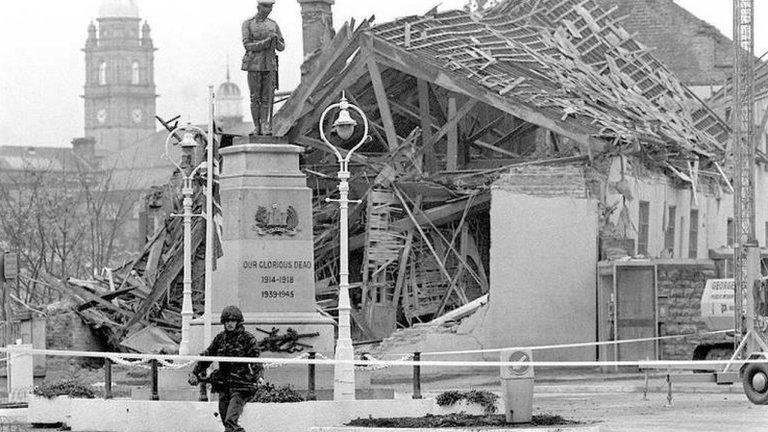Hundreds attend Enniskillen Poppy Day bomb services
- Published
Daphne Stephenson, survivor:" We need to know what [Sinn Fein's] Martin McGuinness knows about the bomb"
Hundreds of people have taken part in memorial services marking the 25th anniversary of the Enniskillen Remembrance Day bomb.
Eleven people were killed and more than 60 injured when an IRA bomb exploded near the town's cenotaph in 1987.
A minute's silence was held at 10:43 GMT to mark the moment when the bomb went off without warning 25 years ago.
The Queen, who visited Enniskillen earlier this year and met victims, has sent a private message to the families.
In it she said her thoughts were with the victims, the bereaved and "all those who bear the scars of that dreadful act".
Those who died in the attack were all Protestant and they included three married couples, a reserve police officer and several pensioners.
Ex-headmaster Ronnie Hill died 13 years after being injured in the attack.
The youngest victim was 20-year-old nurse Marie Wilson whose father, Gordon Wilson, subsequently gave a moving interview in which he said he had prayed for those behind the attack.
Addressing a service at the cenotaph the DUP peer Lord Morrow said that those who carried out the attack had "murder in their hearts".
"We retain hope that one day those responsible will be brought to justice," he said.
The service included a scripture reading by former Ulster Unionist executive minister Sam Foster, who helped to pull the injured from the rubble in the aftermath of the explosion.
The names of those who died as a result of the bombing were read out as flautist Alvin Mullan played Abide with Me.
Relatives of those who died laid wreaths at the cenotaph, which now bears 11 doves to commemorate the victims of the Enniskillen attack. Northern Ireland Secretary Theresa Villiers also laid a wreath.
Michael Gallagher, Stanley McCombe and Kevin Skelton who lost relatives in the 1998 Omagh bombing were among those who also laid wreaths.
Many of those attending the commemoration are also attending a special service St Macartin's Church of Ireland cathedral.
The names of the dead were again read out, with relatives leaving roses before the altar.
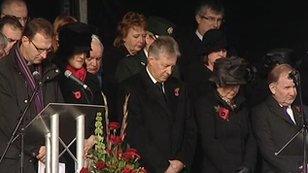
First Minister Peter Robinson and Secretary of State Theresa Villiers were among those at the service
At the service, the Church of Ireland Bishop of Clogher, the Rt Revd John McDowell, praised the "quiet generosity" of the people of the town.
"It is a community that has refused to allow its relationships with one another or its unique spirit to be poisoned by enmity and violence," he said.
The Poppy Day Bomb brought widespread condemnation but no one has ever been charged in connection with the atrocity.
Brian Johnston was at the 1987 parade as a member of the Ulster Defence Regiment. He said that after the explosion they tried to help the victims.
"We ran up though this small alleyway and started to dig the victims out," he said.
"Everybody just did what they had to do we just saw a body or a thing sticking out of the rubble and just tried to dig them out."
Daphne Stephenson survived the blast having been buried in the rubble.
"Twenty-five years hasn't faded the memories I can still at certain times actually feel the rubble falling on top of me. It's all there imprinted on my mind forever," she said.
"I feel that I'm even more determined to speak out and the world needs to know what happened in Enniskillen, what was done to us while we were remembering the dead and we were there and were blew up and it's something that should never be wiped away.
"There was millions spent on a Bloody Sunday Inquiry. It seems that there's justice for some parts of the community and not for others."
"We need to know what Martin McGuinness knows about this, he needs to come clean and tell us."
Speaking during a television debate during the Irish Presidential contest last year Mr McGuinness described the Enniskillen bomb as atrocious and said he felt ashamed when such incidents were carried out in the name of Irish republicanism.
He also denied he was a senior figure in the IRA at the time.
In a statement to the BBC on Thursday, Sinn Fein said Martin McGuinness has said many times in the past that he knows nothing about the Enniskillen bomb.
First Minister Peter Robinson laid a wreath at the war memorial. Afterwards he said that the families of the victims deserved answers.
"People are telling us that they are are keen to have reconciliation, in that they want people to have the truth but they remain silent on what happened on this occasion," he said.
"Let those who want to hear the truth, speak the truth and find out what's happened. I would be very keen that there would be some justice given to these families after such a long period of time."
A special unit of the Police Service of Northern Ireland, the Historical Enquiries Team, has been examining the bombing.
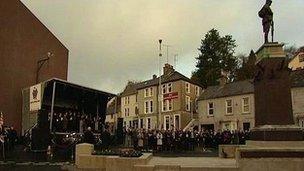
Hundreds of people attended the service
It has passed a report to the Serious Crime Branch, which will examine if there are new lines of enquiry.
Aileen Quinton was living in London when she found out that her mother Alberta was killed.
"There is some notion that it shouldn't matter anymore, that after 25 years it's somehow less evil now but it's not, it is just as evil," she said.
On the same day the IRA also targeted the village of Tullyhommon, 20 miles from Enniskillen, where members of the Boys' and Girls' Brigades were holding a Remembrance Day parade.
The bomb was four times the size of the Enniskillen device but it failed to detonate.
Aileen Quinton said: "Enniskillen would have been a footnote. This would be the 25th anniversary of the slaughter of children at Tullyhommon and that matters, it matters now, that people set out to do that."
- Published8 November 2012
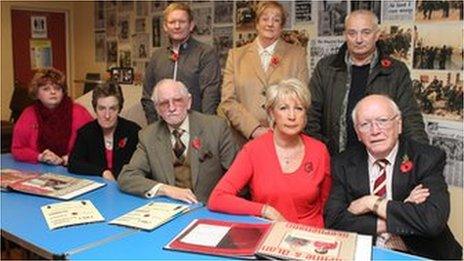
- Published8 November 2012
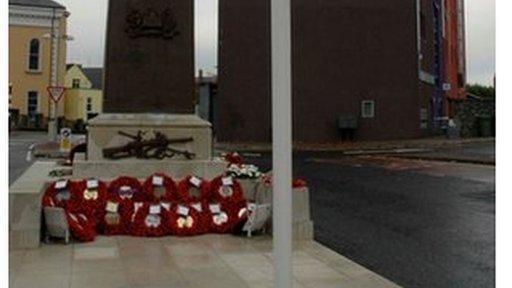
- Published8 November 2017
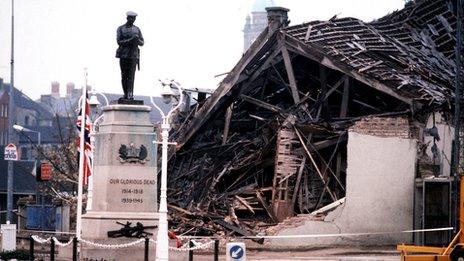
- Published8 November 2012
